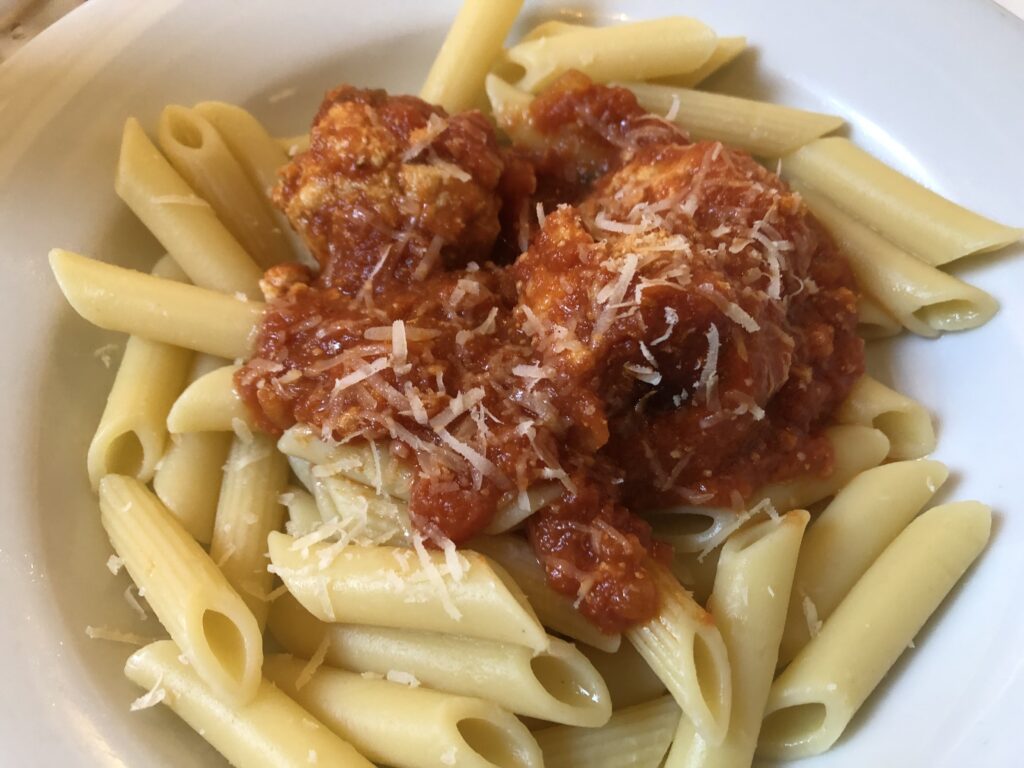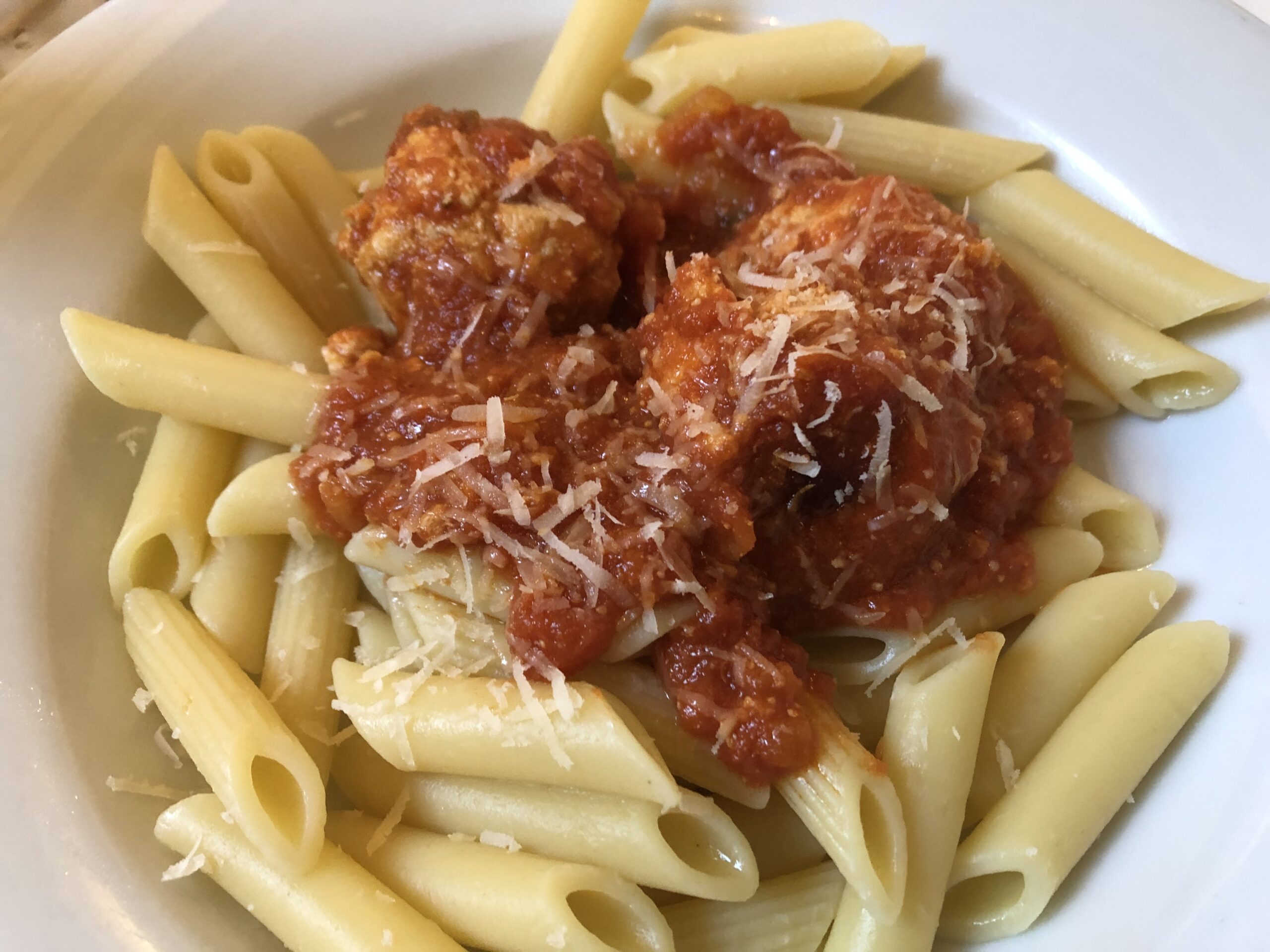‘I am bound, you are bound, to everyone on this planet by a trail of six people.’
Stockard Channing as Ouisa in the film Six Degrees of Separation

When you live in a small town, you are connected to everyone else in surprising ways.
Take for example my butcher in Levanto, whose family operation I have been patronising for 30 years. In the beginning, I went because the meat and poultry are excellent and the father Signor Bernini looked like Omar Sharif. However, when I dropped by to order my roast for the holidays of 2010, I noticed that he stepped back from the counter and let his beaming son Claudio lean in. Unsuspecting, I asked him if he would make me a turkey roast stuffed with pancetta and sausage to braise on top of the stove. He enthusiastically agreed that this was a great idea and would I like it with rosemary as well? I said yes, but also told him that it must not be more than one kilo as we were only two and that anything larger would not fit in my pan. When I came in the next day, Claudio lovingly presented me with a beautiful roast swaddled in pancetta as if it were a newborn baby. ‘You will need no more than a scant hour to cook it,’ he advised. I weighed it at home and the scale read exactly 0.999 kg, not to mention that it was the best turkey we ever had.
A week later, I called the shop and Signor Bernini picked up. When he heard my voice, he immediately passed the phone over to Claudio, who greeted me like a colleague that he hadn’t heard from in a while. I asked if he had a rabbit and if it were fresh. ‘It is still alive, Signora,’ he assured me. Again, when I dropped by the shop, I enjoyed discussing the best way to make coniglio alla ligure with him. He clearly knew his way around the kitchen, but why did I have a new butcher? Was Signor Bernini retiring and entrusting his clients over to his son?
In a small town, everybody knows everybody’s business, and sure enough, my friend and neighbour Giuliana helped me solve the riddle when she casually mentioned that Christina, the daughter of the family who owned and ran the bed-and-breakfast behind my house had married the son of Signor Bernini, the butcher. All of the houses in my tiny village are built next to each other. This bed-and-breakfast has a stone bridge crossing over on to my roof, which they use as a terrace. As bizarre as it sounds, such a blurred boundary is a common and legal occurrence in Italy. The true nature of my relationship with Claudio became crystal clear: we owned joint property.
Claudio has too much class to ever mention our connection outright, and I do no more than tell him to say hello to his wife Christina. Over the years, he has given me invaluable advice on how to cook Italian cuts of meat, and today I will pass on his tips for some meatballs that I made last September:
He sold me an equal mixture of vitello (veal) and vitellone beef, as he considers the taste more refined than that of beef and pork. A milk fed veal calf is slaughtered after 5 or 6 months and only walks on concrete, whereas the vitellone grazes for 3 months before meeting his end at 10 months old. Paler than beef, it has a delicate flavour and very little fat.
As I stepped outside the shop, he caught up to me.
‘One more thing. Don’t use bread or breadcrumbs in your meatballs. Use mashed potatoes.’
I looked at him in surprise. ‘Really? I’ve never heard of that.’
‘The cook of the Agnelli’s told me this. Trust me, they will be much more tender that way.’
We both stared wistfully at the massive stone villa overlooking the sea that belongs to the Fiat dynasty. Would some mashed potato connect me closer to this family? Would I be invited to play tennis in their private park? No, but their cook was certainly worth listening to.
The meatballs that I made with Claudio’s advice were indeed tender, and when I told my neighbour Gina that I had an inside tip from the Agnelli family’s cook, she pricked up her ears and immediately made them for some other neighbours that she was having over for dinner. The tip spread like wildfire. Neighbours soon began to stop by and tell me that they had broken the sacred rules of their family meatball recipes and now swore to use mashed potato forevermore. As an American who is not taken seriously as a cook in Italy, this was quite a coup. Grazie, chef della Famiglia Agnelli.
Notes:
If you do not want to use veal, use any mixture of beef and pork that you prefer. Vitellone is very hard to obtain outside of Italy, and is certainly not necessary. Dark ground turkey meat is fine, too.
Meatball recipes have evolved over the years, and it has now been established that they remain plump and tender if you do not fry them first. Hats off to the people who discovered this time saving fact.
Regarding the sauce: I only used onion, but any tomato sauce you like will work here. However, many Italian American tomato sauce recipes call for an alarming amount of garlic, particularly the ones for meatballs. I have seen recipes where five to eight cloves of crushed garlic are casually added to the marinara. This can totally overpower the taste of the meat. Try cutting back on this allium the next time you make a tomato sauce and see how you like it. Italians often just bruise a clove or two of garlic, gently sauté it in the oil, and then remove it before adding the tomatoes.
Italians do not eat meatballs with pasta the way we do in America. They eat it as a secondo with perhaps some rice and/or vegetables. They don’t know what they’re missing.
There is no other real secret to making meatballs, except that they should never be overmixed, or they will become tough. I find that mixing the eggs, cheese and mashed potatoes together first, then adding it to the meat afterwards helps me avoid producing hockey pucks.
You can also run a test if you are afraid that they are too soft. Make a small meatball and poach it. If it falls apart, don’t panic. Just add one more egg yolk to the meat mixture and gently knead a bit more. This will firm everything up. Adding more potato will just make it softer.
They always taste better if allowed to rest in the sauce and reheated later.
List of Ingredients for the sauce
6 tablespoons of olive oil
1.5 large red or white onions
1 liter of tomato polpa or passata, or even more if meatballs are not covered
Sea salt and pepper to taste
Gently fry onion in the olive oil until translucent.
Take 2 or 3 tablespoons out and set aside for the meatballs.
Add the tomato passata, and the salt and pepper. Simmer gently for approx minutes 30.
List of Ingredients for the Meatballs
2 or 3 tablespoons of the sautéed onion from the tomato sauce.
1 egg
1.5 medium sized potatoes, boiled in their skins, then skinned and sieved through a vegetable mill
1/4 cup of parmigiano
A few sprigs of Italian parsley, finely chopped
The leaves of one sprig of fresh marjoram, or a little bit of freshly grated nutmeg. (Note: marjoram can taste bitter if you use too much of it.)
Sea salt and pepper to taste
500g meat of your choice
In a large bowl, mix the sautéed onion, the egg, the mashed potoato, the parmigiano, the parsley, the marjoram or nutmeg, and salt and pepper. Add the meat, then curve your fingers like a claw and gently but authoritatively blend everything together. Wet hands to prevent them sticking, then form the mixture into meatballs the size of a golf ball.
Bring sauce to a simmer, then gently lower the meatballs into it. Poach for aproximately 20 minutes. Taste, then cook longer if necessary.

